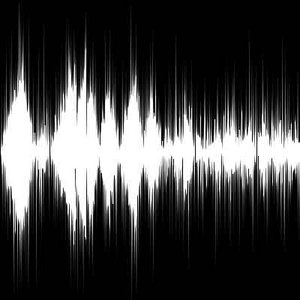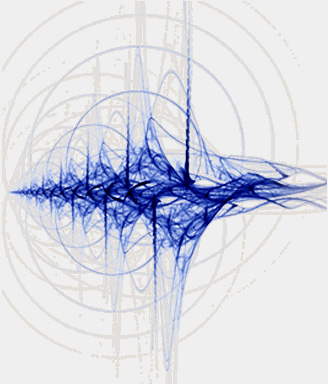I attended a really fascinating lecture on sonic art, in the contemporary art historical context, today at school. Given my obsession with music and sound in general, this was a particularly appealing lecture, delving into phenomenology of sound and sound as art.
The lecture was in many ways an elegant stroll through current art theory vocabulary (which admittedly I find both tedious and exhausting), made bearable by the relevance of sound for its immediacy and nothingness.

This is to say, I wasn't staring at a painting trying to squint enough to make it somehow "phenomenological" or philosophically meaningful. In fact, there was no sound to consider - merely photographs of people constructing sounds without context, such as Pierre Schaeffer splicing magnetic tapes of the sound of a bell after the strike or train engines, constructing etudes from sound waves.
I found the ideas a lot more accessible when I thought about digital mixing and soundboards, the sort of abstracted compositions of electronic and post-rock music. The lecturer dug in for a brilliant Husserl/Derrida face-off, countering Husserl's reduction with "the indivisible moment of the now," calling for an expansive understanding of experience, encouraging acousmatic listening, among many other textual ideas. It was sound theory (pun totally intended), but I was disappointed by the need to identify reduced sound as "dematerialized."

Here I started to stray from the argument because I believe that even though sounds might not be arranged in harmonic or traditional recognizable music theory pitches, they are still mathematically related to one another by virtue of being sound, that is, within an energetic spectrum of tangible experience. To say that sound is "non-musical" seems simply to deny an as-yet-not-fully-understood aesthetic, which strikes me as problematic. And to attempt to reduce sound to a singular experience strikes me as a little absurd, since sound is relative to that which came before and after, intentional or otherwise, and even to silence itself.
I got really bothered when a discussion arose around "particles" having their own properties... this was probably a poor word choice and nothing more, but it stuck with me because I fell asleep reading The Living Cosmos last night, a book about astrobiology that begins with Greek science and atomism. In particular was this idea that all the familiar properties of matter are secondary properties of collections of atoms, but that the atoms themselves have none of these attributes. To say that a particle alone has properties of sound rubbed me the wrong way, especially since I think the lecturer was saying that this particular particle-as-wave was the same thing as a sound wave, in that, as quoted from Brian Kane, "Once Schaeffer commits to reduced listening, there can be no essential difference between imagined hearing and actual hearing." (You like that nice abominable run-on there? I'm not fixing it.)
I am tempted to contradict myself, because there are often frequencies just outside the range of hearing which still trigger a synesthetic response in me (there is one in particular in Penn Station that is so hopelessly painful that it's brought me to tears more than a few times), but for the most part, I am not sure that I think there can exist a pure "sonic object," detached completely from context or source, functioning as the simplest unit of acoustic experience.
To reiterate, no matter what we hear, it is going to be in relation to everything else, and so we are always hearing the mathematical arrangement of sound, however apparently discordant or random. John Cage once described an experience in an Anechoic chamber, saying that in the stillness he became profoundly aware of two constant sounds, one high-pitched and one low-pitched. When he described these sensations later, the technician said he was hearing his nervous and circulatory systems, respectively, which blew his mind (and mine). The thing I kept thinking through, though, is that he was hearing these along with the sound of his own breathing, in contrast with the stillness, and in the context of all that which he had heard and anticipated hearing before. In that respect, I really don't think it's possible to ever just hear one sound at a time, even though there are some sounds that I desperately wish I could.

In so far as there is hope for any media to present a "pure" aesthetic experience, I do believe it exists in sound and music, which is probably a counter intuitive thing for a visual artist to say. Music comes as close to pure energy flooding the brain as I can imagine, and I know I have had many times where I put headphones on, close my eyes, and I lose all feeling of my body or existence, becoming completely immersed in an immediate and infinite sound space. Maybe to a more sophisticated listener, sound would take on the same connotations that the use of a particular pigment, binder, or brushstroke would for me when viewing abstract painting, loaded in history, context, and semiotics... but I think sound could be more universally appreciated because (almost) everyone hears it all the time. Singling out sounds as isolated (but related) experiences just makes so much sense to me.
Lastly, there was a very clever note about the definition of sound as an adjective, as in "sound judgment" or "of sound mind and body," implying that sound somehow knows what it is. The more I think about sound, the more I know this couldn't be further from the truth, and God do I love it for that.
(p.s. I have like, a LOT of reading to do on this subject because I am astoundingly dumb when it comes to music and musicology and sound and physics, so forgive me if I've said a lot of very stupid things.)

Leave a comment